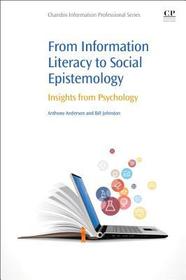
From Information Literacy to Social Epistemology
Insights from Psychology
-
20% KEDVEZMÉNY?
- A kedvezmény csak az 'Értesítés a kedvenc témákról' hírlevelünk címzettjeinek rendeléseire érvényes.
- Kiadói listaár EUR 56.95
-
23 620 Ft (22 495 Ft + 5% áfa)
Az ár azért becsült, mert a rendelés pillanatában nem lehet pontosan tudni, hogy a beérkezéskor milyen lesz a forint árfolyama az adott termék eredeti devizájához képest. Ha a forint romlana, kissé többet, ha javulna, kissé kevesebbet kell majd fizetnie.
- Kedvezmény(ek) 20% (cc. 4 724 Ft off)
- Kedvezményes ár 18 896 Ft (17 996 Ft + 5% áfa)
Iratkozzon fel most és részesüljön kedvezőbb árainkból!
Feliratkozom
23 620 Ft

Beszerezhetőség
Megrendelésre a kiadó utánnyomja a könyvet. Rendelhető, de a szokásosnál kicsit lassabban érkezik meg.
Why don't you give exact delivery time?
A beszerzés időigényét az eddigi tapasztalatokra alapozva adjuk meg. Azért becsült, mert a terméket külföldről hozzuk be, így a kiadó kiszolgálásának pillanatnyi gyorsaságától is függ. A megadottnál gyorsabb és lassabb szállítás is elképzelhető, de mindent megteszünk, hogy Ön a lehető leghamarabb jusson hozzá a termékhez.
A termék adatai:
- Kiadó Elsevier Science
- Megjelenés dátuma 2016. június 13.
- ISBN 9780081005453
- Kötéstípus Puhakötés
- Terjedelem182 oldal
- Méret 228x152 mm
- Súly 210 g
- Nyelv angol 0
Kategóriák
Hosszú leírás:
From Information Literacy to Social Epistemology: Insights from Psychology focuses on information and the ways in which information literacy relates to critical thinking in education, the workplace, and in our social life.
The broad context for our interest is the development in internet technologies often characterised by terms like the 'digital age', leading to questions of digital participation, digital divides, and the role of thinking in the information society.
In short, to what extent is the 'digital age' engendering changes in learning directed towards the better use of information, and in addition, encouraging or even requiring improvements in critical thinking?
TöbbTartalomjegyzék:
Section A: Introduction and background
Chapter 1. Introduction to the book as whole: a) a critical overview of issues and constructs, particularly the digital age, and digital participation; b) the notion of information literacy and the UNESCO human rights model; c) brief overview of epistemological development, critical thinking and metacognition and how these relate to IL and digital participation; d) summary of the structure of the book to follow.
Chapter 2 Information literacy in adult returnee students
Section B: Psychological and educational constructs related to information literacy
Chapter 3 Epistemological development and information literacy
Chapter 4 Metacognition, critical thinking and information literacy: here we consider psychological research on metacognition and critical thinking, summarise it and consider its implications for the processes involved in IL
Chapter 5 Study skills, pedagogy, constructivism, transformational learning, and information literacy
Section C: The contributions from librarians and library organizations; definitions, models and standards for information literacy; current developments in IL; critique and suggestions from psychology and pedagogy e.g. social constructivism as the theoretical basis for particular teaching practices, approaches; IL and lifelong learning
Chapter 6 The ACRL revised standards for IL in higher education
Chapter 7 Curriculum for IL.
Chapter 8 UNESCO formulation of IL and the move to a Media and Information Literacy formulation;
Section D From Information literacy to social epistemology
Chapter 9 Synthesis and conclusions.
Több



